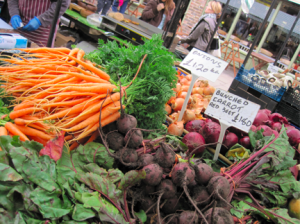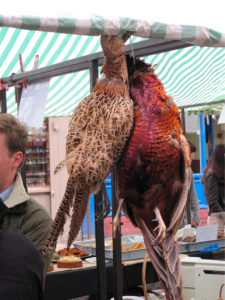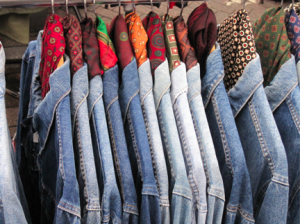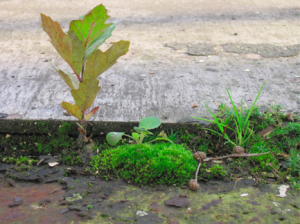The first thing I remember really noticing about the library were the curtains. The library has huge bay windows, about 13 feet high (I once measured), and in them hang some of the most hideous curtains I’ve ever seen. The background color is brown, and they are printed with a floral pattern in, primarily, purple and orange. The string to pull them along is broken, so they are never completely open or completely drawn, and in several spots they hang in shreds. It turns out the shredding has more to do with age than with vandalism; the curtains at the library will shred if you so much as breath on them wrong.
The library is the same vintage building as my elementary school; both are hard-wearing public buildings from the early part of the century. Because of this I instinctively felt at home there, wandering comfortably through the over-stuffed storage room full of out of date magazines, globes and old craft projects or sitting at the forgotten desk in the basement which I appropriated as my own. However, unlike my elementary school, the library had not been favored with much in the way of renovation since its construction. The roof leaked in several places and there were large sections of plaster peeling off the walls. There was no air-conditioning, and during the summer the building frequently had to close due to heat. During the hotter months I spent almost all of my time in the basement, reading or creating story boards out of felt at the ancient desk, and enjoying the comparative cool. The basement tended to be between 5 and 15 degrees cooler than the main library, which meant that if I tried to stay down there in the winter my hands got too cold to turn pages or cut felt. During those months I sat in the window, smack on top of the heating-grate and in perfect position to catch absolutely every ray of winter sunshine. In this way I successfully avoided seasonal affective disorder, although I ran a high risk of turning into a cat.
The year I spent at the library, my mind was largely elsewhere. I was frequently sad and deeply distracted, and reading there, talking with the librarians and the patrons and the kids who showed up after school demanding that I draw them dragons and super heroes and anime characters brought me back to the present a bit. I spent hours hanging out with security guard, whose main interests in life were wrestling (not the staged tv-stuff but the real, competitive, even more homoerotic stuff) and the state of his automobile access. He told me his stories of buying a car, having it totaled, driving his mom’s, leasing a new car, and he beat me at checkers whenever I agreed to play. But we also talked about the universe, and things he’d seen on Discovery Channel, and I challenged his beliefs on gender equality and culture, and was reminded that it’s pretty easy to be a basically cool guy – just be interested without being threatened, and be ready to laugh. He was always ready to laugh. I played checkers with him, knowing he would beat me, just because he took such obvious delight in winning.
There were three librarians: two women who were so different from me that crossing the distance with conversation seemed an overwhelming effort and always trailed off bit by bit until one of us found reason to walk away, and the head librarian, a smart, funny man who looked eerily like the husband and father figure on a popular animated TV comedy about a suburban family. No, not that one – he wasn’t yellow for goddsakes. Yes, there we go – the one set in Rhode Island (naturally). That’s the one.
When we talked, we talked about British TV and the second world war and the state of world and American politics. He told me stories about the other people who had held my job, a yearly stint that tended to be held by folks in a transitional state of life. I was the first girl stationed at the library, and he tended to be careful to warn me about ruffians. Once when I was leaving my car wouldn’t start – battery death, it turned out. He drove around the block, then came back to check on me, having noticed I seemed not to be going anywhere. He waited with me while AAA came, waited till the battery was changed and I could get home.
I spent my mornings away from the library, reading to pre-kindergarten children, which is at least one but probably several other stories. In the afternoon I read, drew and joked with the middle-school aged kids whose mom-sister-aunt-cousin-grandmas weren’t home to let them in yet (or whom they were avoiding), helped shelving books, and helped the adult patrons. Those are the moments that I remember best from the library.
I helped a cuban ballplayer write his first resume, trying to apply for a position coaching at a local school. After playing professionally in Cuba, he had come to play in the American minors, had been on the cusp of being called up to the majors but had hurt his knee. Since then he had worked factory jobs and coached recreationally. When he left, he gave me a hug and thanked me. I still wonder if he got the job.
I helped a wide-smiling, tall and heavyset black gentleman, a general laborer who’s skills went from factory line jobs to generalized construction to specialized installment to short order cooking. He had at some trouble with the law at some point in his past; each job application was a struggle, as he asked me whether he could simply not answer questions about arrests, court appearances, and convictions. Thirty years later, he had done his time – or so I chose to believe, I never asked – and simply wanted to move on. His fingers were too big for a computer keyboard and he had a deeply held belief that his hand writing was terrible (in fact it was perfectly clear script, but it took him a very long time to write it), so I both typed things up for him and filled out applications long hand. Once we got to talking on the Library’s late night, and talked for two hours. After that he came to see me and ask for my help on something or other almost every week, and was very sad to see me go in June; I don’t think he ever understood that helping him was my job as well as my inclination, and when I my job was over I would have to spend my days doing something else. I worry, sometimes, that he feels abandoned now.
Once a young hispanic mother of three asked me for help on a college paper. It turned out that she was arguing for comprehensive education about the human body and sexuality, beginning in elementary school. She told me that she had had her first child when she was 17, and that while she loved all her children, she wished she had been better educated and more able to make informed decisions; that 17 was too young for children. She told me she taught all of her children the proper anatomical names for their genitals; saying that she knew some people who, when asked by their children what the difference between a man and a woman was, said that women have long hair and men have short hair. That, she said, is obviously incorrect – we laughed. I had very short hair, when I worked at the library. I helped her with her citation format, told her how awesome I thought her paper topic was, and walked around for weeks full of hope for society.
Towards the end of the year at the Library I spent some time with a South-East Asian woman, a sort of buddhist nun-at-large. She lived in a structure she’d set up behind the post-office. The librarian used to worry a lot about her, but she seemed to be happy with the situation she’d set up, and I let her be. I helped her set up an e-mail account, tried to teach her the difference between things that you do and information you store on the Internet, and things that you can do and store on an individual computer. We laughed a lot, and she told me I was a pro. Once she asked me if she could set her icon as a picture of her son. I said sure, if she had a picture, I could do that – she showed me a tiny cut out of a printed picture from some magazine, of a marmalade cat. That, she said, was her son – well, not exactly her son, but a cat who looked a lot like her son. She explained to me that she regarded the cat as being like a child to her. We did a google search for images of orange kittens. She chose the one she wanted and I set it as her icon. I wonder if she uses the e-mail for anything, or if without continued guidance, it did’t really take.
There are other images, of the library; the incongruity of kids who spent every afternoon there but still didn’t understand why anybody (me) would want to spend all their time reading. The collection of dying plants. The strange pieces of news that the librarian would bring me, DVDs of TV-shows he thought I’d like, and newspaper clippings, and books that the library wasn’t going to keep. Book sales outside, in the sunshine, and inside, in the evening, with baked goods made by the community and a lot of jokes I didn’t really understand. Children that were much more interested in taking lots of books off the shelf than actually reading any of them; and a few children who weren’t, and really wanted to read the book. Being informed that I should be wearing skinny jeans. Sitting in the weedy garden out back in the fall, the very beginning of the year, reading early science fiction and eating my sandwich and wishing I had things a little better figured out.
The library felt a lot like home – or perhaps like the home of some extended family. It was comfortably, and I could pretty much act with autonomy, as long as I stayed within certain, fairly general restrictions. There were a group of adults who liked me pretty well but didn’t really understand me. There were younger people who felt pretty similarly about me, but showed it in very different ways. The building was old and worn, but basically functional, most of the time. I could bring in as many new ideas as I liked, I could set them up blogs and try out my own thing, and they would be fairly appreciative and game to try them out, but somehow manage to stay just exactly the same even while using new, different tools. Just like your relatives.
And if you are to have a year of transition, and have to deal with a lot of feelings and be sad, and spent a lot of time just reading books and not thinking too hard and letting yourself sort of grow back together inside, it’s a pretty good thing to be able to spend that year in a building with a heating grate in a huge bay window that you can sit on, and people who are basically kind, if a little bit awkward, who aren’t going to judge you or pressure you or expect all that much of you.
The library gave that to me when I needed it, and I will always be thankful for it.






